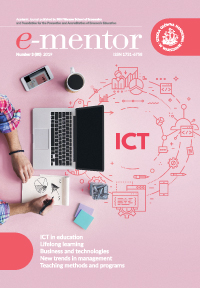The Identity of Young Adults and their E-learning Performance
The Identity of Young Adults and their E-learning Performance
Author(s): Wioletta KwiatkowskaSubject(s): Social Sciences, Education
Published by: Szkoła Główna Handlowa w Warszawie, Fundacja Promocji i Akredytacji Kierunków Ekonomicznych
Summary/Abstract: One of the consequences of the civilizational changes known as liquid modernity is that contemporary humans can experience a virtual reality. Traditional reality, as a result of social and cultural changes, has lost its importance as the leading factor responsible for creating and reinforcing the identities of 21st century individuals. Michel Foucault's (2005) claim that we live in a time of relocation, where young people shape their own identities, thus appears to be valid. Young people no longer exclusively navigate the real world - they look for cultural patterns and points of reference in the virtual one as well. The use of e-learning in higher education is not only inevitable, it also offers new educational opportunities. The virtual world erodes communication and interpersonal barriers, resulting in learners displaying hitherto unknown behaviors and entering into new relationships, which has an impact on how their identities develop.
Journal: e-mentor
- Issue Year: 80/2019
- Issue No: 3
- Page Range: 18-23
- Page Count: 5
- Language: English

